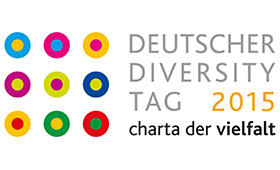Diversity offers opportunities – especially in vocational education and training
Facts on the 3rd German Diversity Day
20/2015 | Bonn, 08.06.2015

The 3rd German Diversity Day will be taking place all over the country on 9 June. This year’s event will be staged under the motto of “Undertaking diversity” and will involve companies and institutions nationwide, all seeking to highlight the issue. “In vocational education and training, diversity is of crucial significance in terms of securing the supply of skilled workers,” stressed Friedrich Hubert Esser, President of the Federal Institute for Vocational Education and Training (BIBB). “The exploitation of all areas of potential, the integration and support of young people from a migrant background and the inclusion of disadvantaged young people are all essential to economic performance and a prosperous society.” Analyses undertaken by BIBB in the 2015 Data Report provide facts on the everyday working lives of trainees from a migrant background. Trainees who are undergoing company-based training feel themselves to be a full and complete part of a social community. Through their company environment, they receive a high degree of support without any difference according to migrant background.
Regardless of migrant background, the vast majority of trainees (78%) believe that they are in a position to meet occupational requirements. Although trainees from a migrant background are less likely to find a training place in their preferred occupation, overall satisfaction with their everyday working lives is on a similar level to trainees who are not from a migrant background. They are similarly likely to perceive work requirements, such as deadlines and pressure, as burdensome.
With regard to the evaluation of the reality of training within the company, however, BIBB’s analysis on the basis of the Youth Employment Survey it conducts in conjunction with the Federal Institute for Occupational Safety and Health (BAuA) also reveals differences between the two groups. Trainees from a migrant background, for example, are less likely to be faced with new tasks. They are more likely to be affected by monotony in the tasks they perform and feel that this places a greater burden on them. This is an area in which BIBB’s experts are calling for varied activities that foster learning to be assigned to young people on a regular basis, since the BIBB research results have shown that such activities exert the strongest effect on the motivation of trainees.
Nevertheless, young people from a migrant background continue to experience greater difficulties in finding a training place. An analysis carried out on the basis of data from the Federal Employment Agency/BIBB Applicant Survey shows that only 29% of applicants from a migrant background registered with the Federal Employment Agency (BA) for the training year 2013-2014 had progressed to company-based training by the end of 2014 as opposed to 44% in the case of ap-plicants not from a migrant background. Even though many of these subsequently succeeded in entering training, the results of BIBB transitional studies reveal that making the transition to training is more difficult in overall terms for those from a migrant background. “Much needs to be done with regard to improving general conditions and in terms of the use and recognition of the potential of all young people and of diversity”, said BIBB President Esser.
BIBB signed the “Diversity Charter” as long ago as 2007. Its aims have been firmly established within the institute’s own mission statement and form an integral part of day-to-day operations. The proportion of staff at BIBB from a migrant background is, for example over 13 percent. An internal survey has revealed that these employees or their families come from 17 different nations or cultures. “The diversity of our trainees and colleagues at BIBB has been a very positive experience,” concluded the BIBB President.
The “Diversity Charter” is an initiative aimed at promoting diversity in companies and institutions. Its patron is the Federal Chancellor, and further support is provided by the Federal Government Commissioner for Migration, Refugees and Integration. The initiative is funded by the not-for-profit association “Charta der Vielfalt e.V.”, which is also the initiator of the German Diversity Day.
On 9 June, BIBB and its “Recognition for Germany” portal will join forces with the “Integration through Training” funding programme (IQ) to take part in an open-air diversity event at Potsdamer Platz in Berlin, where guidance will be provided in both German and English on the recognition of foreign professional and vocational qualifications. The motto on the day will be “Be great at your job – in Germany too?”. For more details, please visit: www.anerkennung-in-deutschland.de/html/en/1691.php
English language Information on the association Charta der Vielfalt e.V. and on the 3rd Germany Diversity day is available at http://www.charta-der-vielfalt.de/en/diversity-charter.html and http://www.charta-der-vielfalt.de/en/diversity-day.html respectively.
For further information on the BIBB study results included in the 2015 BIBB Data Report, in particular Chapters A.3.1.1 and A 4.9, please go to www.bibb.de/datenreport. The issue is also addressed in BIBB REPORT 5/2014, available in English at https://www.bibb.de/veroeffentlichungen/en/publication/show/id/7512
Reprint free of charge – voucher copy requested.